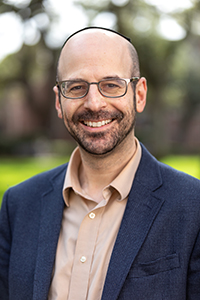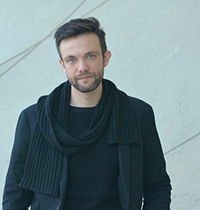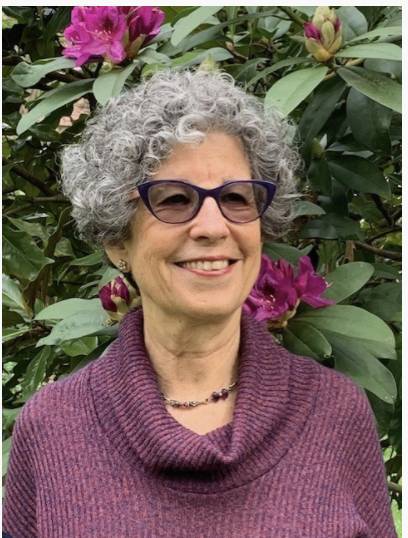A Focus on Israel
This year has been one with a tremendous amount of Israel content. We are offering two new classes on Israel. One is Contemporary Israeli Society & Cultures. This class has no prerequisites and is open to all students, fulfills a general education requirement, and will be offered every year. The new course changes themes and introduces students to different aspects of Israeli society. The second course is an upper division course for seniors and graduate students on Zionism and the State of Israel. It will be offered in alternate years and focus on the history of Zionism and the creation of the state of Israel. Concurrent with these new courses have been enrichment programs connected to the courses including a virtual play called Borders, which explored a love story between an Israeli man and a Lebanese man who met over the internet. This spring, we will have a series on the history of Zionism.
This year's Karen and Pace Robinson Lecture Series was on the history of Zionism.
 In Zionism: Ancient Dream or Modern Revolution, Joshua Shanes discussed the Zionist idea exploring the ways in which it is tied to the past as well as how it is a modern phenomenon. Zionism - like all forms of modern Judaism - considers itself an obvious consummation of thousands of years of Judaism and of Jewish longing for the Land of Israel. Yet, like all forms of Judaism today, it is quintessentially modern. It is in fact a secular revolution that draws selectively on Jewish tradition - choosing some texts over others, some traditions over others - to make its case for authenticity. In his lecture, Shanes explained the emergence of the Zionist movement in its time and trace how it fit into the mosaic of modern Judaisms in the 20th century.
In Zionism: Ancient Dream or Modern Revolution, Joshua Shanes discussed the Zionist idea exploring the ways in which it is tied to the past as well as how it is a modern phenomenon. Zionism - like all forms of modern Judaism - considers itself an obvious consummation of thousands of years of Judaism and of Jewish longing for the Land of Israel. Yet, like all forms of Judaism today, it is quintessentially modern. It is in fact a secular revolution that draws selectively on Jewish tradition - choosing some texts over others, some traditions over others - to make its case for authenticity. In his lecture, Shanes explained the emergence of the Zionist movement in its time and trace how it fit into the mosaic of modern Judaisms in the 20th century.
Shanes is associate professor of Jewish Studies and director of the Arnold Center for Israel Studies at the College of Charleston. He has published widely on modern Jewish politics, culture, and religion - as well as antisemitism and contemporary politics - in academic and popular outlets, including Slate, Washington Post, Haaretz, and the Forward.
 For the next lecture, Zionism and the First World War, Jan Rybak discussed the ways in which and reasons Zionism spread within Jewish communities during and after the First World War. The years of the First World War in many respects saw the breakthrough of the Zionist movement. From just over 100,000 members worldwide in 1913 it multiplied sixfold until 1921. But this change was not only quantitative but also qualitative. The British government promised the establishment of a “Jewish national home” in Palestine and Zionist leaders came to be involved in negotiations with governments – or even took over positions as ministers. Especially in Eastern and Central Europe, the Zionist movement developed from often rather isolated groups of predominantly male middle-class activists into a mass movement with deed roots in local communities and in many places, Zionists managed to assume communal leadership.
For the next lecture, Zionism and the First World War, Jan Rybak discussed the ways in which and reasons Zionism spread within Jewish communities during and after the First World War. The years of the First World War in many respects saw the breakthrough of the Zionist movement. From just over 100,000 members worldwide in 1913 it multiplied sixfold until 1921. But this change was not only quantitative but also qualitative. The British government promised the establishment of a “Jewish national home” in Palestine and Zionist leaders came to be involved in negotiations with governments – or even took over positions as ministers. Especially in Eastern and Central Europe, the Zionist movement developed from often rather isolated groups of predominantly male middle-class activists into a mass movement with deed roots in local communities and in many places, Zionists managed to assume communal leadership.
Rybak is a fellow at the Birkbeck Institute for the Study of Antisemitism at the University of London. He holds a PhD in history from the European University Institute in Florence and has previously worked at the University of York, the University of Salzburg. He is the author of Everyday Zionism in East-Central Europe: Nation-Building in War and Revolution, 1914–1920, published by Oxford University Press in 2021.
In Tel Aviv and the Creation of Urban Zionism, Rachel S. Harris, spoke on Tel Aviv and the creation of the concept of Urban Zionism. Harris is associate professor of Israeli Literature and Culture in Comparative and World Literature and the Program in Jewish Culture and Society at the University of Illinois, Urbana-Champaign. Her recent publications include An Ideological Death: Suicide in Israeli Literature (2014) and Warriors, Witches, Whores: Women in Israeli Cinema (2017). She is the editor of Teaching the Arab-Israeli Conflict (2019), and co-editor of Narratives of Dissent: War in Contemporary Israeli Arts and Culture (2011) and Casting a Giant Shadow: The Transnational Shaping of Israeli Cinema (2021).
Our final lecture, Desert in the Promised Land, takes place Thursday, April 7 at 5:30 p.m. via Zoom.
 Yael Zerubavel will tell the story of the desert in Zionist and Israeli consciousness from the early twentieth century to the present. She draws on Zerubavel’s book, Desert in the Promised Land, published by Stanford University Press (2019). The desert has been at once an ecological phenomenon and a symbolic landscape that carries biblical and historical associations. In his presentation, she will address its complex role in the Zionist imagination and in the history of the Jewish settlement of the Negev desert from the early twentieth century to the present. She highlights the complexities and sheds light on the contradictions that mark its varied interpretation as a frontier, periphery, and a unique ecological environment.
Yael Zerubavel will tell the story of the desert in Zionist and Israeli consciousness from the early twentieth century to the present. She draws on Zerubavel’s book, Desert in the Promised Land, published by Stanford University Press (2019). The desert has been at once an ecological phenomenon and a symbolic landscape that carries biblical and historical associations. In his presentation, she will address its complex role in the Zionist imagination and in the history of the Jewish settlement of the Negev desert from the early twentieth century to the present. She highlights the complexities and sheds light on the contradictions that mark its varied interpretation as a frontier, periphery, and a unique ecological environment.
Yael Zerubavel is professor emerita of Jewish Studies and history at Rutgers University, where she served as the founding director of the Allen and Joan Bildner Center for the Study of Jewish Life (1996-1918) and the chair of the Department of Jewish Studies. Professor Zerubavel has published extensively in the areas of collective memory and identity, national myths, the transformation of traditions, war and trauma, and cultural perceptions of space, drawing on historical sources, Hebrew literature, educational materials, popular and folkloric forms, as well as in-depth interviews. She is the author of the award-winning book, Recovered Roots: Collective Memory and the Making of Israeli National Tradition (University of Chicago Press, 1995) and Desert in the Promised Land (Stanford University Press, 2019), and the coeditor (with Amir Goldstein) of: Tel Hai, 1920-2020: Between History and Memory (in Hebrew).
Registration is required. To register, go to: tiny.utk.edu/Desertinthesand